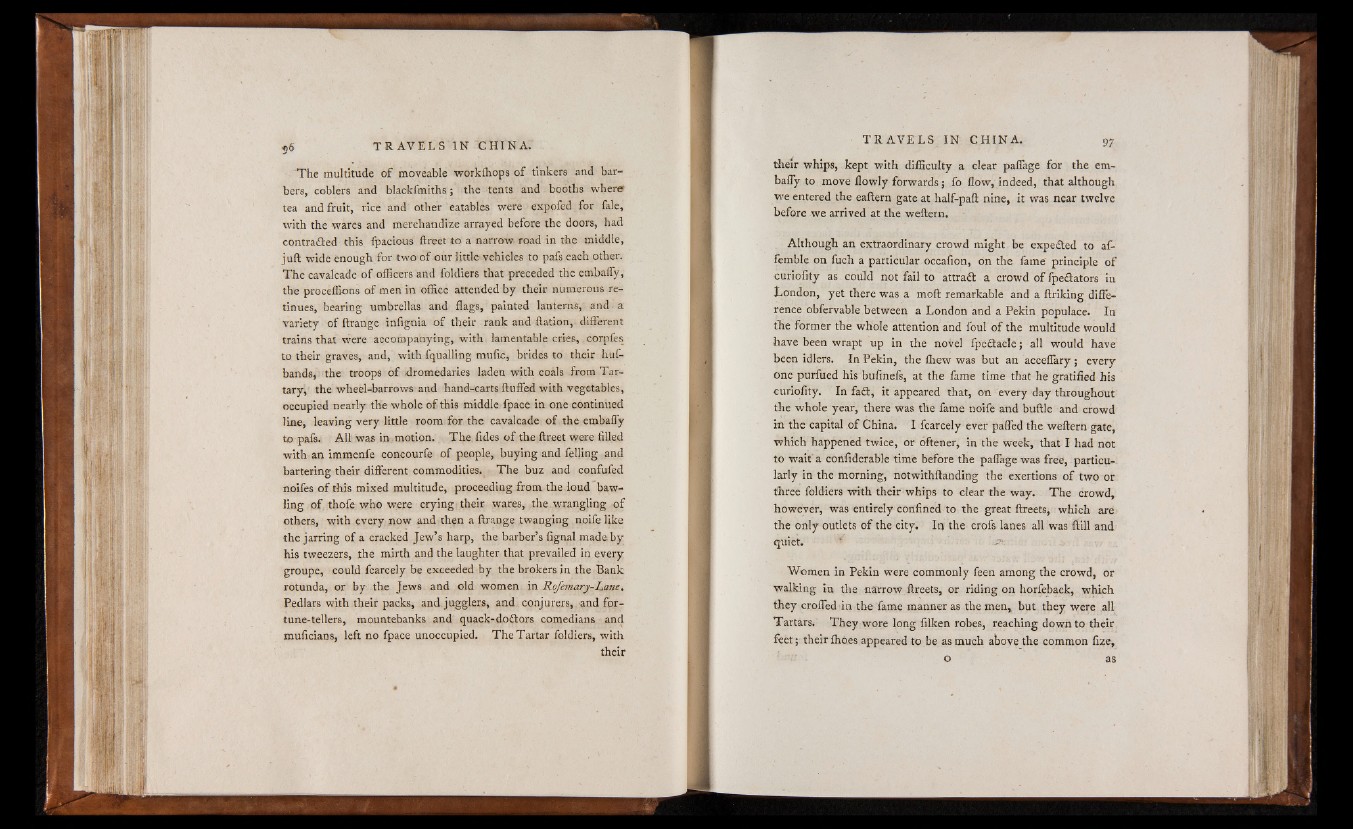
The multitude o f moveable workfhops o f tinkers and barbers,
coblers and blackfmiths; the tents and booths where
tea and fruit, rice and other eatables were expofed for fale,
with the wares and merchandize arrayed before the doors, had
contrasted this fpacious flreet to a narrow road in the middle,
juft wide enough for two o f our little-vehicles to pafs each other.
The cavalcade o f officers and foldiers that preceded the embaify,
the procefiions o f men in office attended by their numerous retinues,
bearing umbrellas and flags, painted lanterns, and a
variety of ftrange infignia o f their rank and ftation, different
trains that were accompanying, with lamentable cries, corpfes
to their graves, and, with fqualling mufic, brides to their huf-
bands, the troops o f dromedaries laden with coals from Tar-
tary, the wheel-barrows and hand-carts fluffed with vegetables,
occupied nearly the whole o f this middle fpace in one continued
line, leaving very little room for the cavalcade o f the embaffy
to pafs. All was in motion. The. fides o f the flreet were filled
with an immenfe concourfe o f people, buying and felling and
bartering their different commodities. The buz and confufed
noifes o f this mixed multitude, proceeding from the loud bawling
o f thofe who were crying their wares, the.wrangling o f
others, with every now and then a flrange twanging noife like
the jarring o f a cracked Jew’s harp, the barber’s fignal made by
his tweezers, the mirth and the laughter that prevailed in every
groupe, could fcarcely be exceeded by the brokers in the Bank
rotunda, or by the Jews and old women in Rofemary-Lam.
Pedlars with their packs, and jugglers, and conjurers,, and fortune
tellers, mountebanks and quack-do&ors comedians and
muficians, left no fpace unoccupied. The Tartar foldiers, with
their
their whips, kept with difficulty a clear paffage for the embaffy
to move flowly forwards; fo flow, indeed, that although
we entered the eaflern gate at half-pail nine, it was near twelve
before we arrived at the weftern.
Although an extraordinary crowd might be expe&ed to af-
femble on fuch a particular occafion, on the fame' principle o f
cufiofity as could not fail to attrail a crowd o f fpeflators in
London, yet there was a moil remarkable and a flriking difference
obfervable between a London and a Pekin populace. In
the former the whole attention and foul o f the multitude would
have been wrapt up in the novel fpe£tacle; all would have
been idlers. In Pekin, the fhew was but an acceffary ; every
one purfued his bufinefs, at the fame time that he gratified his
curiofity. In fa il, it appeared that, on every day throughout
the whole year, there was the fame noife and buflle and crowd
in the capital o f China. I fcarcely ever paffed the weftern gate,
which happened twice, or oftener, in the week, that I had not
to w a if a confiderable time before the paffage was free, particularly
in the morning, notwithftanding the exertions o f two or
three foldiers with their whips to clear the way. The crowd,
however, was entirely confined to the great flreets, which are
the only outlets o f the city. In the crofs lanes all was flill and
quiet. t
Women in Pekin were commonly feen among the crowd, or
walking in the narrow flreets, or riding on horfeback, which
they croffed in the fame manner as the men, but they were all
Tartars. The y wore long filken robes, reaching down to their
feet; their ffioes appeared to be as much above the common fize,
o as